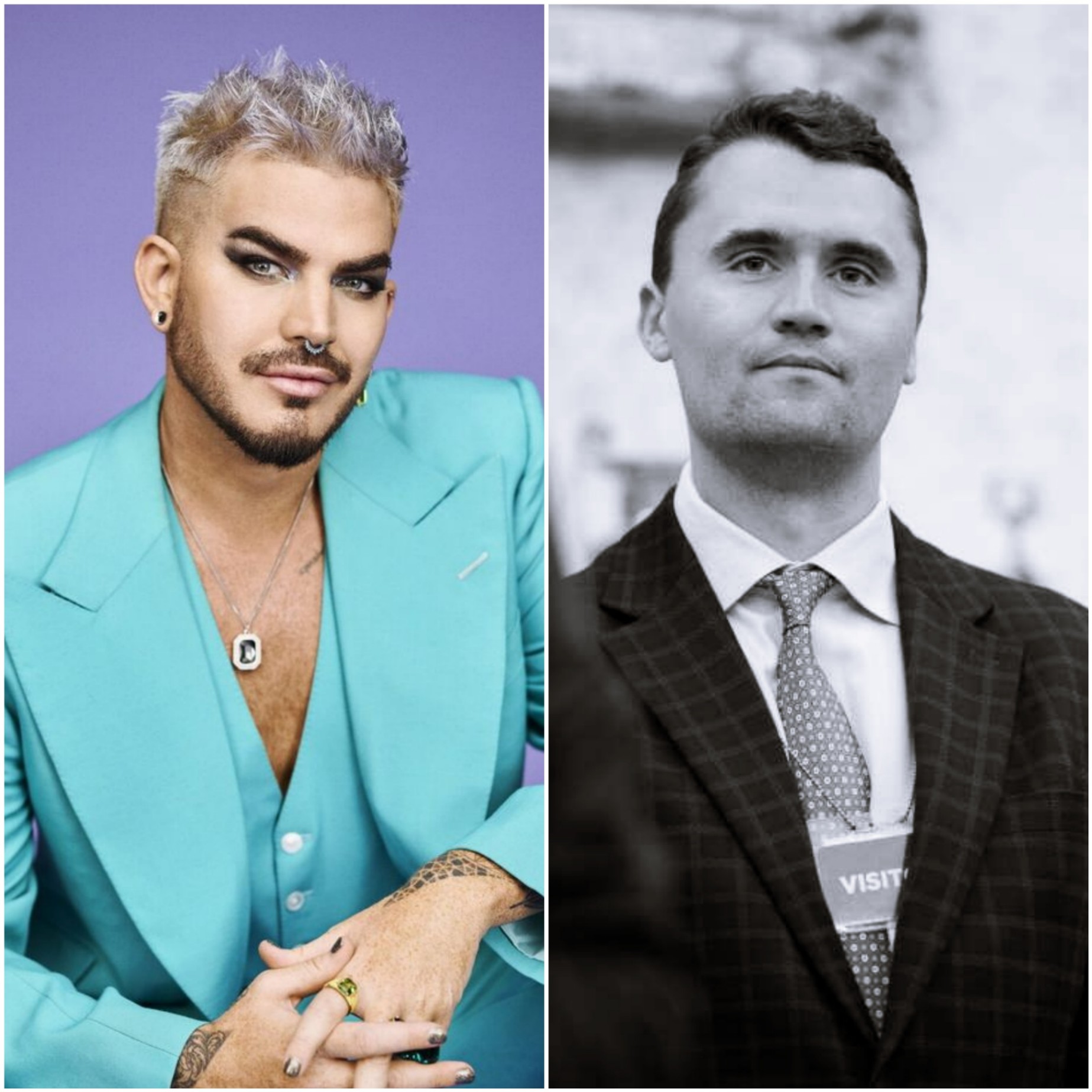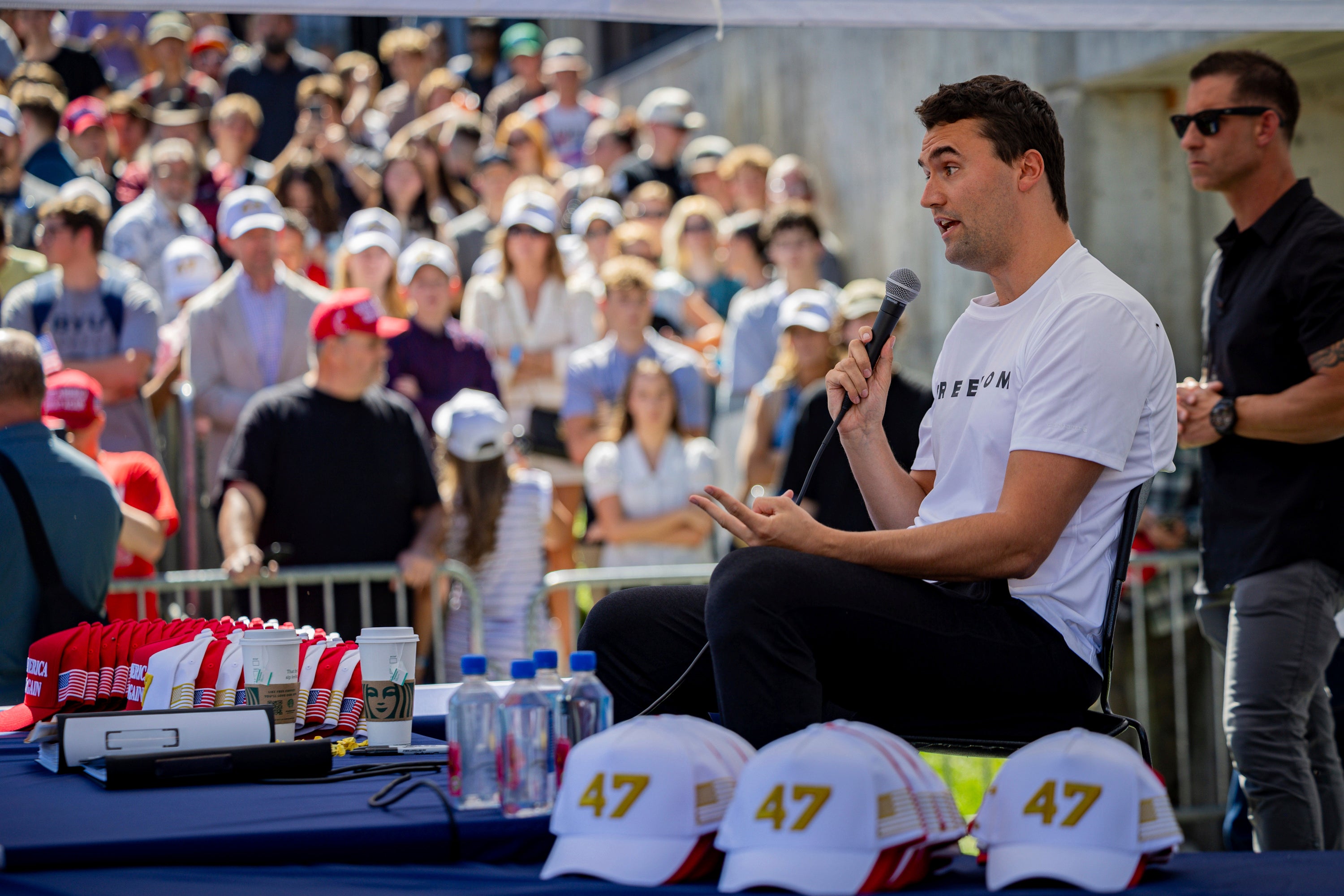BREAKING NEWS 🚨: Adam Lambert Calls for Nationwide Unity in Emotional Tribute to Charlie Kirk

In a world often divided by politics, fame, and fleeting headlines, one voice has risen above the noise with an act of profound sincerity. Music icon Adam Lambert, celebrated for his powerful vocals and fearless individuality, has stunned the nation — not with a performance, but with a call for unity, remembrance, and healing.
During his latest tour stop, Lambert paused the stage lights, silenced the instruments, and asked tens of thousands in attendance to join him in a moment of silence. The gesture, though simple, carried extraordinary weight: it was dedicated to the late Charlie Kirk, founder of the National Unity Foundation, who tragically passed away during a community event just days earlier.

The hush that followed was unlike anything fans had ever experienced. For nearly a full minute, thousands of people — fans of all ages, from all walks of life — bowed their heads in silence. Cell phone lights flickered across the arena like stars against the night, and in that stillness, Lambert’s voice broke the silence:
“We’re not just singing for ourselves,” he said, his voice trembling. “We’re singing for the values that built this country. Unity is something that should never be forgotten.”
It was raw. It was real. And it left the audience in tears.
Lambert, known for his electrifying performances and larger-than-life stage presence, stripped it all away for one brief, powerful moment. Gone were the dazzling costumes and glittering lights. What remained was a man grappling with grief, searching for meaning, and choosing to use his voice not only to entertain but also to inspire.
For a performer whose career has spanned global tours and chart-topping singles, the act of stillness may have been his most powerful performance yet. Fans later described it as “a moment of spiritual connection” and “a reminder of what music is truly for.”
Charlie Kirk, though not a household name to all, left an undeniable mark on the communities he touched. As the founder of the National Unity Foundation, his mission was clear: bridge divides, foster understanding, and remind Americans that common ground is still possible.
Friends recall him as tireless, sometimes fiery, but always devoted to the idea that people — regardless of background or belief — could come together for something greater than themselves. His sudden passing at a community event sent shockwaves through civic organizations and grassroots movements across the country.
It was precisely this vision of unity that struck a chord with Adam Lambert.
Lambert has long been admired for his authenticity, both on and off the stage. Throughout his career, he has been vocal about issues of acceptance, equality, and compassion. But this tribute marked a new depth in his public persona — one that transcended artistry and reached into the realm of national conscience.
By honoring Kirk’s legacy, Lambert bridged two worlds often seen as opposites: the vibrant, boundary-pushing world of pop culture and the quieter, grassroots fight for unity. The moment symbolized that grief, respect, and hope are not confined by political or cultural lines — they are human.
Almost instantly, social media erupted. Clips of the silence went viral, garnering millions of views within hours. Fans described the night as “life-changing,” with many sharing their own stories of division, reconciliation, and healing.
One fan wrote:
“I came to sing and dance, but I left with tears in my eyes. Adam reminded us that music isn’t just about the beat — it’s about the bond we share as people.”
Another tweeted:
“Charlie Kirk’s legacy lives on in ways he probably never imagined. Tonight, Adam Lambert turned a concert into a prayer.”
What began as a single tribute quickly grew into something larger. Inspired by Lambert’s words, fans began calling for similar moments of silence across sports games, community gatherings, and even classrooms. Churches, town halls, and civic centers echoed with dedications to Kirk’s vision of unity.
The National Unity Foundation released a statement of gratitude:
“Charlie always believed that one voice could inspire millions. Tonight, Adam Lambert proved him right.”
Part of what made the tribute so moving was Lambert’s own vulnerability. On stage, he did not hide his emotions. His voice cracked. His eyes watered. For an artist who has built a career on confidence and flamboyance, the choice to be vulnerable was itself a message: true strength lies not in perfection, but in honesty.
By showing his own grief, Lambert gave permission for others to grieve as well. He reminded the audience that in moments of loss, it is not weakness to mourn — it is strength to feel, to honor, and to continue.
In a time when headlines are filled with conflict, polarization, and outrage, Lambert’s tribute felt like a pause button. It reminded many that beyond the arguments and divides, there is still space for shared humanity.
“Unity is not about agreeing on everything,” Lambert said later in a backstage interview. “It’s about remembering that at the end of the day, we’re neighbors, we’re family, we’re human. That’s worth fighting for.”
Lambert has pledged to continue dedicating a moment of silence before each of his concerts on this tour. What began as a tribute may very well become a tradition — a ritual that audiences will carry forward long after the final encore.
For many, the thought is deeply comforting: that even in a world fractured by differences, there can still be moments where thousands of people, strangers to one another, stand side by side in silence, united by memory and hope.
Charlie Kirk’s voice may have been silenced, but through Adam Lambert’s tribute, his message echoes louder than ever. The call for unity is not bound to one foundation, one community, or one stage. It is bound to every person willing to stop, remember, and reach for something greater.
As Lambert continues his tour, each moment of silence will remind us that grief can become hope, and loss can become legacy. It will remind us that music, at its core, has always been about more than melody — it has been about meaning.
And perhaps, in those quiet, breathless minutes before the music begins again, we will hear something more powerful than any song: the heartbeat of a nation longing to be whole.




